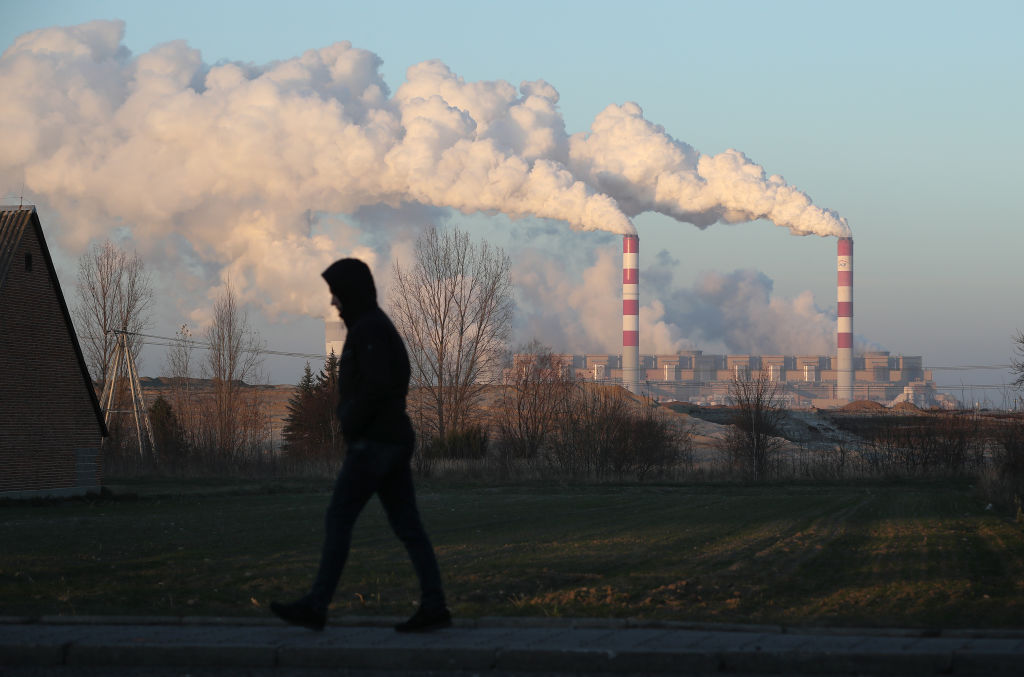Pollution might make us too stupid to fight pollution, study finds


A free daily email with the biggest news stories of the day – and the best features from TheWeek.com
You are now subscribed
Your newsletter sign-up was successful
The climate change effects of rising levels of carbon dioxide are fairly well-known — but what if this air pollution makes us dumber, too? That's the proposal of the University of Colorado's Kris Karnauskas, an ocean sciences professor, in a paper he co-authored and presented at an American Geophysical Union meeting this fall.
"This is a hidden impact of climate change," Karnauskas explained in an interview withThe Atlantic, "that could actually impact our ability to solve the problem itself."
Atmospheric carbon dioxide levels have risen to around 410 parts per million from about 280 parts per million 250 years ago. Indoor carbon dioxide concentrations tend to be higher than the atmospheric baseline thanks to human breathing, which means that the higher that baseline goes, Karnauskas theorizes, the more rapidly poorly ventilated rooms will reach levels able to impair cognition.
The Week
Escape your echo chamber. Get the facts behind the news, plus analysis from multiple perspectives.

Sign up for The Week's Free Newsletters
From our morning news briefing to a weekly Good News Newsletter, get the best of The Week delivered directly to your inbox.
From our morning news briefing to a weekly Good News Newsletter, get the best of The Week delivered directly to your inbox.
Prior research suggests those effects become noticeable around 945 parts per million, and at 1,400 parts per million cognitive function can go down by 50 percent. However, a different study found no impairment at 3,000 parts per million, linking cognitive decline to other indoor air pollutants instead.
The paper Karnauskas co-wrote has not yet been peer reviewed, and "[t]here's got to be a lot more work on this," he told The Atlantic. For example, it's possible high carbon dioxide levels only affect certain populations or certain types of cognition, or that they act to intensify the effects of other particles but don't directly hurt our thinking ability. In the meantime, though, does it seem stuffy in here to you?
A free daily email with the biggest news stories of the day – and the best features from TheWeek.com
Bonnie Kristian was a deputy editor and acting editor-in-chief of TheWeek.com. She is a columnist at Christianity Today and author of Untrustworthy: The Knowledge Crisis Breaking Our Brains, Polluting Our Politics, and Corrupting Christian Community (forthcoming 2022) and A Flexible Faith: Rethinking What It Means to Follow Jesus Today (2018). Her writing has also appeared at Time Magazine, CNN, USA Today, Newsweek, the Los Angeles Times, and The American Conservative, among other outlets.
-
 Ex-South Korean leader gets life sentence for insurrection
Ex-South Korean leader gets life sentence for insurrectionSpeed Read South Korean President Yoon Suk Yeol was sentenced to life in prison over his declaration of martial law in 2024
-
 Rubio boosts Orbán ahead of Hungary election
Rubio boosts Orbán ahead of Hungary electionSpeed Read Far-right nationalist Prime Minister Viktor Orbán is facing a tough re-election fight after many years in power
-
 Key Bangladesh election returns old guard to power
Key Bangladesh election returns old guard to powerSpeed Read The Bangladesh Nationalist Party claimed a decisive victory
-
 Epstein files topple law CEO, roil UK government
Epstein files topple law CEO, roil UK governmentSpeed Read Peter Mandelson, Britain’s former ambassador to the US, is caught up in the scandal
-
 Iran and US prepare to meet after skirmishes
Iran and US prepare to meet after skirmishesSpeed Read The incident comes amid heightened tensions in the Middle East
-
 EU and India clinch trade pact amid US tariff war
EU and India clinch trade pact amid US tariff warSpeed Read The agreement will slash tariffs on most goods over the next decade
-
 Israel retrieves final hostage’s body from Gaza
Israel retrieves final hostage’s body from GazaSpeed Read The 24-year-old police officer was killed during the initial Hamas attack
-
 China’s Xi targets top general in growing purge
China’s Xi targets top general in growing purgeSpeed Read Zhang Youxia is being investigated over ‘grave violations’ of the law



